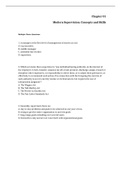Chapter 01
Modern Supervision: Concepts and Skills
Multiple Choice Questions
1. A manager at the first level of management is known as a(n):
A. top executive.
B. middle manager.
C. assembly-line worker.
D. supervisor.
2. Which act states that a supervisor is "any individual having authority, in the interest of
the employer, to hire, transfer, suspend, lay off, recall, promote, discharge, assign, reward or
discipline other employees, or responsibility to direct them, or to adjust their grievances, or
effectively to recommend such action, if in connection with the foregoing the exercise of
such authority is not of a merely routine or clerical nature, but requires the use of
independent judgment"?
A. The Wagner Act
B. The Taft-Hartley Act
C. The Norris-La Guardia Act
D. The Fair Labor Standards Act
3. Generally, supervisors focus on:
A. day-to-day problems and goals to be achieved in one year or less.
B. trying to get the entire organization to meet its goals.
C. long-range goals extending over several years.
D. themselves only and are not concerned with organizational goals.
,4. Because supervisors deal directly with employees and have knowledge about an
organization's customers, they emphasize a(n):
A. task orientation.
B. technique orientation.
C. people orientation.
D. outcome orientation.
,5. According to Abraham Maslow's hierarchical pattern of needs, the most basic needs of
any human being are:
A. safety needs.
B. physiological needs.
C. needs related to love and belonging.
D. esteem needs.
6. Which of the following includes an attitude of acceptance, a lack of racial biases, and
creativity?
A. Self-actualization
B. Physiological needs
C. Needs related to love and belonging
D. Esteem needs
7. The ability to see the relationship of the parts to the whole and to one another is known
as:
A. technical skills.
B. human relations skills.
C. conceptual skills.
D. process skills.
8. Bundy has worked at the local shoe store for years. His ability to sell the most women's
shoes month after month is an example of:
A. ambitious skills.
B. conceptual skills.
C. motivational skills.
D. technical skills.
, 9. For a supervisor, conceptual skills would include:
A. recognizing how the work of various employees affects the performance of the
department as a whole.
B. the specialized knowledge and expertise used to carry out particular techniques or
procedures.
C. the ability to communicate with, motivate, and understand people.
D. the ability to analyze information and reach good decisions.




